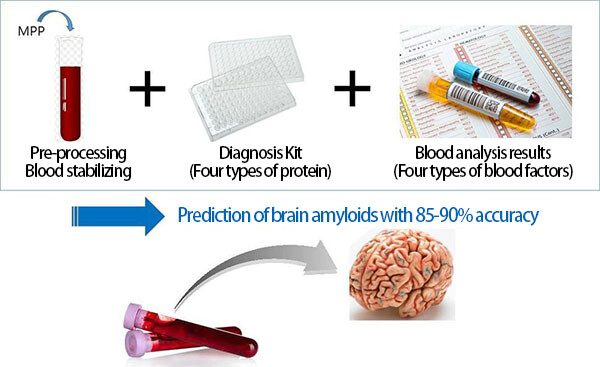hankyoreh
Links to other country sites 다른 나라 사이트 링크
S. Korean research team develops new technology for predicting Alzheimer’s disease

A South Korean research team has developed technology for predicting Alzheimer’s disease in normal people through blood test results. With its acquisition by a venture business specializing in Alzheimer’s diagnosis and treatment, the technology is expected to lead to development of diagnostic tools to replace prohibitively expensive positron emission tomography (PET) scan testing.
“A state-run Alzheimer’s prediction research group involved in a development project for neuroscience source technology has developed new technology for predicting the occurrence Alzheimer’s disease through blood testing before symptoms emerge, and the technology has been transferred to a domestic company,” the Ministry of Science and ICT announced on Oct. 23.
One of the most well-known forms of dementia, Alzheimer’s disease occurs as beta amyloid proteins accumulate within the brain. An effective approach to early diagnosis is through blood testing before the beta amyloid damages nerve cells, but reliable testing methods have not been available.
A team led by professors Mook In-hee and Lee Dong-young from the state-run Alzheimer’s prediction research group increased the accuracy of measurement through a system that uses a new blood pre-processing technique (MPP) to stabilize beta amyloid concentrations in the blood. The team also developed new blood biomarkers, which are closely associated with the beta amyloid deposits within the brain. Whereas previous Alzheimer’s diagnoses have been made by autopsy or through brain imaging with expensive amyloid PET scanning equipment, the new technique uses a small amount of blood to generate the same findings as an amyloid PET scan with a 90% confidence level.
“While most dementia diagnosis techniques involve classifying patients with clear symptoms, the technique developed by our research term allows for Alzheimer’s prediction at the normal, asymptomatic stage,” Mook explained.
The research team has published in the noted international Alzheimer’s journal “Alzheimer’s Research and Therapy.” It has completed domestic patent registration procedures and currently applying for patents overseas. Three related examples of technology have been acquired by a domestic venture business specializing in Alzheimer’s disease, which is now working on diagnostic kits and algorithms for use in clinical settings.
By Lee Keun-young, senior staff writer
Please direct questions or comments to [english@hani.co.kr]

Editorial・opinion
![[Column] Has Korea, too, crossed the Rubicon on China? [Column] Has Korea, too, crossed the Rubicon on China?](https://flexible.img.hani.co.kr/flexible/normal/500/300/imgdb/original/2024/0419/9317135153409185.jpg) [Column] Has Korea, too, crossed the Rubicon on China?
[Column] Has Korea, too, crossed the Rubicon on China?![[Correspondent’s column] In Japan’s alliance with US, echoes of its past alliances with UK [Correspondent’s column] In Japan’s alliance with US, echoes of its past alliances with UK](https://flexible.img.hani.co.kr/flexible/normal/500/300/imgdb/original/2024/0419/2317135166563519.jpg) [Correspondent’s column] In Japan’s alliance with US, echoes of its past alliances with UK
[Correspondent’s column] In Japan’s alliance with US, echoes of its past alliances with UK- [Editorial] Does Yoon think the Korean public is wrong?
- [Editorial] As it bolsters its alliance with US, Japan must be accountable for past
- [Guest essay] Amending the Constitution is Yoon’s key to leaving office in public’s good graces
- [Editorial] 10 years on, lessons of Sewol tragedy must never be forgotten
- [Column] A death blow to Korea’s prosecutor politics
- [Correspondent’s column] The US and the end of Japanese pacifism
- [Guest essay] How Korea turned its trainee doctors into monsters
- [Guest essay] As someone who helped forge Seoul-Moscow ties, their status today troubles me
Most viewed articles
- 1[Column] The clock is ticking for Korea’s first lady
- 2[Correspondent’s column] In Japan’s alliance with US, echoes of its past alliances with UK
- 3Samsung barricades office as unionized workers strike for better conditions
- 4After 2 months of delayed, denied medical care, Koreans worry worst may be yet to come
- 5[Column] Has Korea, too, crossed the Rubicon on China?
- 6[Editorial] When the choice is kids or career, Korea will never overcome birth rate woes
- 7Hong Se-hwa, voice for tolerance whose memoir of exile touched a chord, dies at 76
- 8US overtakes China as Korea’s top export market, prompting trade sanction jitters
- 9Constitutional Court rules to disband left-wing Unified Progressive Party
- 10Nearly 1 in 5 N. Korean defectors say they regret coming to S. Korea